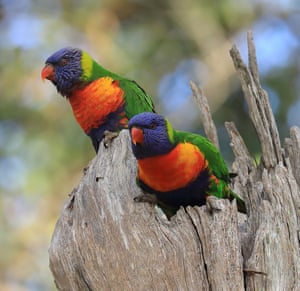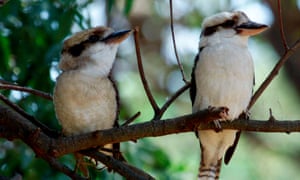Extract from The Guardian
Listening to the voluble morning choir spurs feelings of wonder and gratefulness to be alive on our sublime planet.
Like a lot of people, I am not sleeping as well as I was a few months ago.
I am still able to nod off fairly easily, and unlike many, my sleep is not often broken with fits of staring anxiously at the ceiling. I am, however, waking up much earlier, well before dawn.
I live in a very quiet suburb at the best of times – the nearest train line and major highway half an hour’s walk away. But lately, in the pre-dawn darkness, the world outside my window is as still as death: no car engines warming up in commuters’ driveways, no pounding footfall of joggers on a pre-work run. All is unnervingly silent, as if the world is broken and I am alone with my dark thoughts.
But then I hear those first, welcome notes. Some mornings it’s the comforting soft carolling of the Australian magpie, others it’s the repetitive, urgent piping of gangs of noisy miners. Soon they will be joined by the silvery song of the grey butcherbird, the smaller cousin of the magpie whose large beak tricks people into thinking they are baby kookaburras. The local pied currawongs might chip in with their evocative chimes resonating in the stillness. The screech of rainbow lorikeets hurtling towards their morning feast of nectar from the neighbourhood flowering gums punctuate the air.
I am still able to nod off fairly easily, and unlike many, my sleep is not often broken with fits of staring anxiously at the ceiling. I am, however, waking up much earlier, well before dawn.
I live in a very quiet suburb at the best of times – the nearest train line and major highway half an hour’s walk away. But lately, in the pre-dawn darkness, the world outside my window is as still as death: no car engines warming up in commuters’ driveways, no pounding footfall of joggers on a pre-work run. All is unnervingly silent, as if the world is broken and I am alone with my dark thoughts.
But then I hear those first, welcome notes. Some mornings it’s the comforting soft carolling of the Australian magpie, others it’s the repetitive, urgent piping of gangs of noisy miners. Soon they will be joined by the silvery song of the grey butcherbird, the smaller cousin of the magpie whose large beak tricks people into thinking they are baby kookaburras. The local pied currawongs might chip in with their evocative chimes resonating in the stillness. The screech of rainbow lorikeets hurtling towards their morning feast of nectar from the neighbourhood flowering gums punctuate the air.
The sepulchre of night is peeled back as the world turns towards the light of the new day. Listening to the contributions of each member of the voluble choir spurs feelings of wonder and gratefulness to be alive on our sublime planet. The dawn chorus reconnects me to life; a sense of hope returns. It is my favourite moment of each of these strange, new days.
In our noisy, industrial society, birdsong has largely been drowned out, all too easy to ignore. However, in the quietude of lockdown and isolation many of us have once again become attuned to their sound breaking the silence. BirdLife Australia has been inundated with people wanting to share or have identified the birds who have been visiting their garden.
One Melbourne birdwatcher started an online movement, #birdthefeckathome which encourages people to record birds they have seen in their backyards. Since launching at the end of March, the site has logged over 2,600 species – around a quarter of the world’s birds. In the radio talkback segments I’ve been doing, callers are freaking out that the birds “were going crazy” but almost all the behaviours described were fairly standard for Australian birds who are a gregarious and outlandish lot.

Birdsong still welcomes the dawn every morning and I find enormous comfort in that. This is why on Sunday I plan to rise early and acknowledge the joy those sounds bring as part of International Bird Chorus Day. It was started by British naturalist Chris Baines in 1984 who roped in some friends to celebrate a significant birthday by joining him to listen for the first bird calls of the day.
At this time of year, the migrant songbirds have returned to the English countryside and fill the air with their sweet, lilting warblings. Though some, such as Adam Lindsay Gordon and his “songless, bright birds” or more recently – and more delightfully – Sam Neill and his raven impersonations might regard Australian birds as a raucous cacophony, the fact is that songbirds evolved in Australia and our birds, as vocally splendid as they are boldly marked, do not need the impetus of spring to belt out a squawk or two.
On Sunday I will be listening for these comforting, yet bittersweet sounds – palpable reminders of the natural world I am cut off from, while at the same time providing me an essential connection to the world I once knew, the world to which I want to return.
Sean Dooley is national Public affairs manager at BirdLife Australia

No comments:
Post a Comment